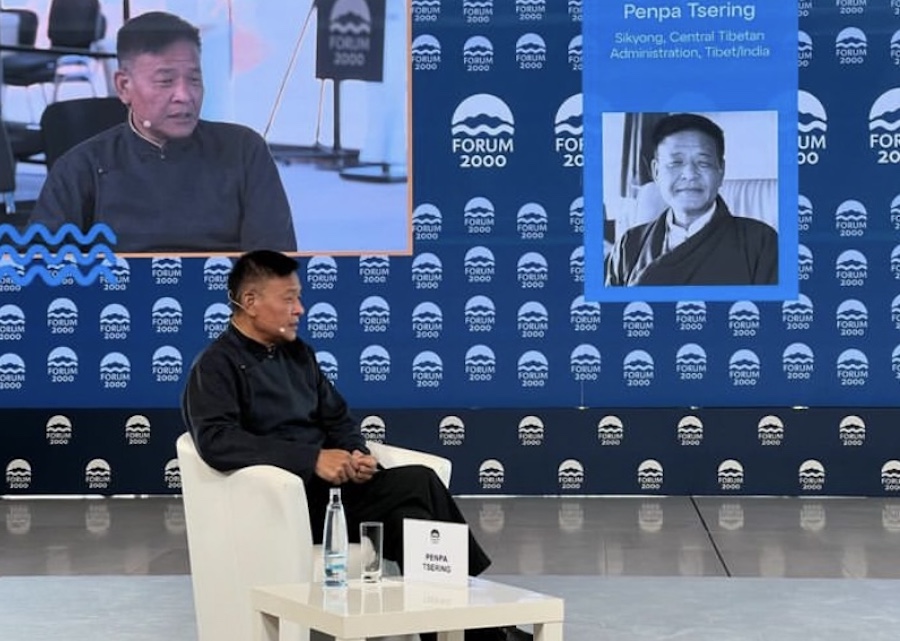Tenzin Nyidon
DHARAMSHALA, Oct. 17: The democratically elected leader of the exile Tibetan government, known officially as the Central Tibetan Administration (CTA), President Penpa Tsering emphasised the CTA’s roadmap for ensuring the succession of the 14th Dalai Lama remains free from Chinese interference while speaking on the topic ‘Future of Tibet?’ at the 28th Forum 2000 held in Prague, Czech Republic.
In a bold statement, President Tsering suggested that instead of focusing on the reincarnation of the Dalai Lama, China should concern itself with finding the reincarnation of Mao Zedong. His comment was a sharp critique, made in response to question about Beijing’s repeated claims of having the authority to decide the next Dalai Lama.
“The reincarnation in Tibetan Buddhism is unique, where we have reincarnated Lamas, which China refers to as ‘living Buddhas.’ They have been preparing for the death of the Dalai Lama for the last 20 years or more. They are not concerned about the living 14th Dalai Lama but are more focused on the yet-to-come 15th Dalai Lama,” said Tsering.
He highlighted that His Holiness the Dalai Lama has often commented on China’s intentions, noting that if the Chinese government were genuinely serious about reincarnation, they should first study Tibetan Buddhism, which centers on the belief in life after death. “Maybe they should look for Mao Zedong’s reincarnation first, Deng Xiaoping’s reincarnation second, and now that Jiang Zemin is also no more, perhaps they should look into Jiang Zemin’s reincarnation as well,” Tsering added with pointed humour.
During the forum, the Tibetan leader also outlined the CTA’s strategy to safeguard the sanctity of the Dalai Lama’s reincarnation process. This roadmap involves the exile government collecting statements and resolutions from Buddhist communities worldwide as evidence of their collective stance on the issue. “The Tibetan Buddhist community will be most impacted by His Holiness’ reincarnation,” Tsering stated.
He further hinted at the possibility of an upcoming announcement from His Holiness the 14th Dalai Lama regarding his succession plans. “Maybe next year, His Holiness will say something about his succession or reincarnation plans. He will definitely make a statement on how the process will take place. Whether it happens next year or a few years after that is for His Holiness to decide. There is only one document regarding His Holiness’s reincarnation, which is the September 2011 document,” Tsering said.
In the same conversation, Penpa Tsering addressed several pressing issues, including the ongoing cultural genocide in Tibet and the colonial-style boarding schools designed to assimilate Tibetan children. He also touched upon the back-channel dialogues and the Dalai Lama’s unwavering commitment to democratic principles throughout his life.
The Tibetan stateman concluded the discussion with a thought-provoking question; “How are democracies empowering authoritarianism?” He criticised the way Western democracies have inadvertently fueled China’s rise to power. “China has all the political and military power because of its foreign exchange reserves, which they splurge on Belt and Road Initiatives (BRI), space technology, and military while initiating debt traps around the world,” he said.
“Politicians tell me that the dragon is biting at us, and I told them the dragon was once very weak. Who fed the dragon to become so strong it can bite? It is the U.S., Europe, and Japan.” He argued that to challenge China effectively, focusing on its economy is key. “If you want to bring China to its knees, then the economy is the answer,” he suggested, emphasising that reducing business with China could be a powerful means to challenge China’s overall threat.










